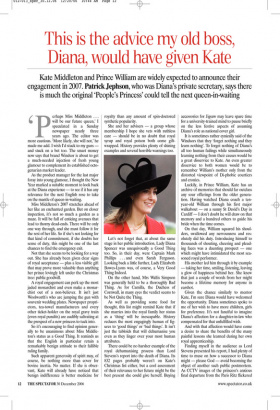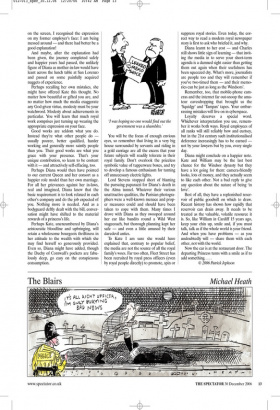This is the advice my old boss,
Diana, would have given Kate Kate Middleton and Prince William are widely expected to announce their engagement in 2007. Patrick Jephson, who was Diana’s private secretary, says there is much the original ‘People’s Princess’ could tell the next queen-in-waiting ‘P erhaps Miss Middleton ... will be our future queen,’ I speculated in a Sunday newspaper nearly three years ago. The editor was more cautious. ‘More likely, she will not,’ he made me add. I wish I’d stuck to my guns and stuck on a bet too. The smart money now says that brand Windsor is about to get a much-needed injection of fresh young glamour to complement its established octogenarian market leader.
As the product manager for the last major foray into young glamour, I thought the New Year marked a suitable moment to look back at the Diana experience — to see if it has any relevance for the next English rose to take on the mantle of queen-in-waiting.
Miss Middleton’s 2007 stretches ahead of her like an enchanted garden. But on closer inspection, it’s not so much a garden as a maze. It will be full of enticing avenues that lead to thorny dead-ends. There will be only one way through, and she must follow it for the rest of her life. So if she’s not looking for that kind of commitment, if she doubts her sense of duty, this might be one of the last chances to find the emergency exit.
Not that she seems to be looking for a way out. She has already been given clear signs of royal acceptance — plus a less visible gift that may prove more valuable than anything her prince lovingly left under the Christmas tree: public goodwill.
A royal engagement can perk up the most jaded monarchist and even make a monarchist out of a non-believer. It isn’t just Woolworth’s who are jumping the gun with souvenir wedding plates. Newspaper proprietors, tea-towel manufacturers and every other ticket-holder on the royal gravy train (even royal pundits) are audibly salivating at the prospect of a new princess to tuck into.
So it’s encouraging to find opinion generally to be unanimous about Miss Middleton’s status as a Good Thing. It reminds us that the English in particular retain a remarkably benign attitude to their fallible ruling family.
Such apparent generosity of spirit may, of course, be nothing more than cover for bovine inertia. No matter. If she is observant, Kate will already have noticed that benign indifference is better medicine for royalty than any amount of spin-doctored synthetic popularity.
She and her advisers — a group whose membership I hope she vets with ruthless care — should be in no doubt that royal syrup and royal poison both come giftwrapped. History provides plenty of shining examples and several horrible warnings too.
Let’s not forget that, at about the same stage in her public introduction, Lady Diana Spencer was unequivocally a Good Thing too. So, in their day, were Captain Mark Phillips ... and even Sarah Ferguson. Looking back a little further, Lady Elizabeth Bowes-Lyons was, of course, a Very Good Thing Indeed.
On the other hand, Mrs Wallis Simpson was generally held to be a thoroughly Bad Thing. As for Camilla, the Duchess of Cornwall, in many eyes the verdict seems to be Not Quite the Thing.
As well as providing some food for thought, this list might remind Kate that if she marries into the royal family her status as a ‘thing’ will be inescapable. History reduces the most engagingly human of figures to ‘good things’ or ‘bad things’. It isn’t just the tabloids that will dehumanise you even as they linger over your most human attributes.
There could be no harsher example of the royal dehumanising process than Lord Stevens’s report into the death of Diana. Its 832 pages probably weren’t on Kate’s Christmas list either, but a cool assessment of their relevance to her future might be the best present she could give herself. Buying accessories for Jigsaw may leave spare time for a university-trained mind to pause briefly on the less festive aspects of assuming Diana’s role as national cover girl.
It is sometimes rather cynically said of the Windsors that they ‘forget nothing and they learn nothing’. To forget nothing of Diana’s all too human failings while simultaneously learning nothing from their causes would be a great disservice to Kate. An even greater disservice to both women would be to remember William’s mother only from the distorted viewpoint of Di-phobic courtiers and cronies.
Luckily, in Prince William, Kate has an archive of memories that should far outclass any sour offerings from the older generation. Having watched Diana coach a tenyear-old William through his first major walkabout — on a sunny St David’s Day in Cardiff — I don’t doubt he will draw on that memory and a hundred others to guide his bride when the time comes.
On that day, William squared his shoulders, swallowed any nervousness and resolutely did his duty. Introducing himself to thousands of shouting, cheering and pleading faces was a daunting prospect — one which might have intimidated the most seasoned royal performer.
His mother led him through it by example — taking her time, smiling, listening, leaving a glow of happiness behind her. She knew that just a couple of words from her might become a lifetime memory for anyone in earshot.
Given the chance similarly to mentor Kate, I’m sure Diana would have welcomed the opportunity. Diana sometimes spoke to me of her wish to have more children, girls for preference. It’s not fanciful to imagine Diana’s affection for a daughter-in-law who compensated for that unfulfilled wish.
And with that affection would have come a desire to share the benefits of the many painful lessons she learned during her own royal apprenticeship.
Finding myself in the audience as Lord Stevens presented his report, I had plenty of time to muse on how a successor to Diana might — please God — avoid becoming the object of another such public postmortem. As CCTV images of the princess’s anxious final departure from the Paris Ritz flickered on the screen, I recognised the expression on my former employer’s face: I am being messed around — and there had better be a good explanation!
And maybe, after the explanation had been given, the journey completed safely and happier years had passed, the unlikely figure of Diana as mother-in-law would have leant across the lunch table at San Lorenzo and passed on some painfully acquired nuggets of experience.
Perhaps recalling her own mistakes, she might have offered Kate this thought. No matter how beautiful or gifted you are, and no matter how much the media exaggerate any God-given virtue, modesty must be your watchword. Modesty about achievements in particular. You will learn that much royal work comprises just turning up wearing the appropriate expression on your face.
Good works are seldom what you do. Instead they’re what other people do usually poorer, better qualified, harder working and generally more saintly people than you. Their good works are what you grace with your presence. That’s your unique contribution, so learn to be content with it — and attractively self-effacing, too.
Perhaps Diana would then have pointed to our current Queen and her consort as a happier role model than her own marriage. For all her grievances against her in-laws, real and imagined, Diana knew that the basic requirement is to look relaxed in each other’s company and do the job expected of you. Nothing more is needed. And as a bodyguard deftly dealt with the bill, conversation might have shifted to the material rewards of a princess’s life.
Perhaps Kate, unencumbered by Diana’s aristocratic bloodline and upbringing, will retain a wholesome bourgeois thriftiness in her attitude to the wealth with which she may find herself so generously provided. Even so, Diana might have added, though the Duchy of Cornwall’s pockets are fabulously deep, go easy on the conspicuous consumption. You will be the focus of enough envious eyes, so remember that living in a very big house surrounded by servants and riding in a gold carriage are all the excess that your future subjects will readily tolerate in their royal family. Don’t overlook the priceless symbolic value of tupperware boxes, and try to develop a famous enthusiasm for turning off unnecessary electric lights.
Lord Stevens stopped short of blaming the pursuing paparazzi for Diana’s death in the Alma tunnel. Whatever their various unattractive qualities, the Parisian photographers were a well-known menace and proper measures could and should have been taken to cope with them. Many times I drove with Diana as they swooped around her car like bandits round a Wild West stagecoach, but thorough planning kept her safe — and even a little amused by their daredevil antics.
To Kate I am sure she would have explained that, contrary to popular belief, the media are not the source of all the royal family’s woes. Far too often, Fleet Street has been recruited by royal press officers (even by royal people directly) to promote, spin or suppress royal stories. Even today, the correct way to read a modern royal newspaper story is first to ask who briefed it, and why.
Diana learnt to her cost — and Charles still shows little sign of learning — that inviting the media in to serve your short-term agenda is a damned sight easier than getting them out again when their usefulness has been squeezed dry. What’s more, journalists are people too and they will remember if you’ve two-timed them — and their memories can be just as long as the Windsors’.
Remember, too, that mobile-phone cameras and the internet far out-snoop the amateur eavesdropping that brought us the ‘Squidgy’ and ‘Tampax’ tapes. Your embarrassing mistakes will live on in cyberspace.
Loyalty deserves a special word. Whichever interpretation you use, remember it works both ways. Royal employees of all ranks will still reliably bow and curtsey, but in the 21st century such institutionalised deference increasingly has to be earned not by your lawyers but by you, every single day.
Diana might conclude on a happier note. Kate and William may be the last best chance for the Windsor dynasty but they have a lot going for them: camera-friendly looks, lots of money, and they actually seem to like each other. Not a bad reply to give any question about the nature of being ‘in love’.
Best of all, they have a replenished reservoir of public goodwill on which to draw. Recent history has shown how rapidly that reservoir can drain away. It needs to be treated as the valuable, volatile resource it is. So, like William in Cardiff 15 years ago, keep your chin up, smile and, if you must talk, talk as if the whole world is your friend. And when you have problems — as you undoubtedly will — share them with each other, not with the world.
Now the car is at the restaurant door. The departing Princess turns with a smile as if to add something....
© 2006 Patrick Jephson





































 Previous page
Previous page